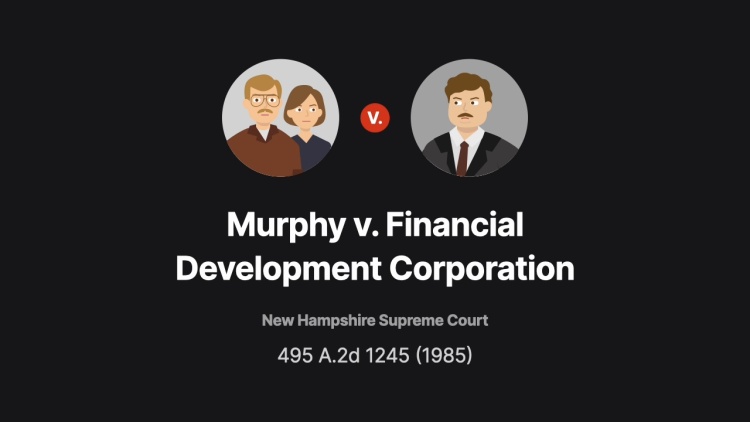Murphy v. Financial Development Corp.
New Hampshire Supreme Court
495 A.2d 1245 (1985)
- Written by Dennis Chong, JD
Facts
Richard and Beatrice Murphy (plaintiffs) refinanced their mortgage with Financial Development Corporation, which assigned it to Colonial Deposit Company (collectively, the lenders) (defendants). The house was appraised at $46,000. Richard Murphy lost his job, and the Murphys wound up behind on payments. The lenders advised the Murphys of their intent to foreclose. The Murphys paid off the arrearage but not the fees. At the Murphys’ request, the lenders delayed the sale, but the Murphys were unable pay in time. The lenders provided the required legal notice of the foreclosure sale but did not otherwise advertise. The lenders did not publicize the postponement or have the house re-appraised. The only bidder at the sale was a representative of the lenders, who bid $27,000 on the house—just enough to cover the debt. The bid was accepted. Later that day, the lenders refused an offer to buy the property for $27,000. The lenders countered at $40,000 and sold the house for $38,000 two days later. The Murphys sued to set aside the sale or for money damages. The trial court, adopting the findings of a master, concluded that the lenders had acted in bad faith and failed to exercise due diligence in the sale. The court awarded the Murphys $27,000, the difference between the fair market value of the house, $54,000, and the foreclosure-sale price. The lenders appealed to the New Hampshire Supreme Court.
Rule of Law
Issue
Holding and Reasoning (Douglas, J.)
What to do next…
Here's why 907,000 law students have relied on our case briefs:
- Written by law professors and practitioners, not other law students. 47,100 briefs, keyed to 996 casebooks. Top-notch customer support.
- The right amount of information, includes the facts, issues, rule of law, holding and reasoning, and any concurrences and dissents.
- Access in your classes, works on your mobile and tablet. Massive library of related video lessons and high quality multiple-choice questions.
- Easy to use, uniform format for every case brief. Written in plain English, not in legalese. Our briefs summarize and simplify; they don’t just repeat the court’s language.





